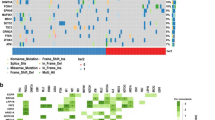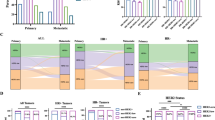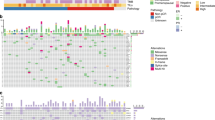Abstract
Introduction
We explored clinical implication of intrinsic molecular subtype in human epidermal growth factor receptor 2 (HER2) + metastatic breast cancer (BC) with pan-HER inhibitor from a phase II clinical trial of poziotinib in refractory HER2+BC patients.
Methods
For this translational research correlated with phase II clinical trial, we performed an nCounter expression assay, using gene panel including 50 genes for PAM50 prediction and targeted deep sequencing.
Results
From 106 participants, we obtained 97 tumor tissues and analyzed gene expression in 91 of these samples. Of 91 HER2+BCs, 40 (44.0%) were HER2-enriched (E) intrinsic molecular subtype, 17 (18.7%) of Luminal A, 16 (17.6%) of Basal-like, 14 (15.4%) of Luminal B and 4 (4.4%) of Normal-like. HER2-E subtype was associated with hormone receptor negativity (odds ratio [OR] 2.93; p = 0.019), 3 + of HER2 immunohistochemistry(IHC) (OR 5.64; p = 0.001), high mRNA expression of HER2 (OR 14.43; p = 0.001) and copy number(CN) amplification of HER2 (OR 12.80; p = 0.005). In genetic alterations, alteration was more frequently observed in HER2-E subtype (OR 3.84; p = 0.022) but there was no association between PIK3CA alteration and HER2-E subtype (p = 0.655). In terms of drug efficacy, high mRNA expression of HER2 was the most powerful predictor of poziotinib response (median progression-free survival [PFS): 4.63 months [high] vs. 2.56 [low]; p < .001). In a combination prediction model, median PFS of intrinsic subtypes except Her2-E with high HER2 mRNA expression without PIK3CA genetic alteration was 6.83 months and that of the remaining group was 1.74 months (p < .001).
Conclusion
HER2-E subtype was associated with hormone receptor status, HER2 IHC, CN and mRNA expression and TP53 mutation. In survival analysis, the information of level of HER2 mRNA expression, intrinsic molecular subtype and PI3K pathway alteration would be independent predictors to poziotinib treatment.
ClinicalTrials.gov identifier: NCT02418689.





Similar content being viewed by others
References
Perou CM, Sorlie T, Eisen MB, van de Rijn M, Jeffrey SS, Rees CA, Pollack JR, Ross DT, Johnsen H, Akslen LA, Fluge O, Pergamenschikov A, Williams C, Zhu SX, Lonning PE, Borresen-Dale AL, Brown PO, Botstein D (2000) Molecular portraits of human breast tumours. Nature 406:747–752. https://doi.org/10.1038/35021093
Ross DT, Scherf U, Eisen MB, Perou CM, Rees C, Spellman P, Iyer V, Jeffrey SS, Van de Rijn M, Waltham M, Pergamenschikov A, Lee JC, Lashkari D, Shalon D, Myers TG, Weinstein JN, Botstein D, Brown PO (2000) Systematic variation in gene expression patterns in human cancer cell lines. Nat Genet 24:227–235. https://doi.org/10.1038/73432
Sorlie T, Perou CM, Tibshirani R, Aas T, Geisler S, Johnsen H, Hastie T, Eisen MB, van de Rijn M, Jeffrey SS, Thorsen T, Quist H, Matese JC, Brown PO, Botstein D, Lonning PE, Borresen-Dale AL (2001) Gene expression patterns of breast carcinomas distinguish tumor subclasses with clinical implications. Proc Natl Acad Sci USA 98:10869–10874. https://doi.org/10.1073/pnas.191367098
Carey LA, Perou CM, Livasy CA, Dressler LG, Cowan D, Conway K, Karaca G, Troester MA, Tse CK, Edmiston S, Deming SL, Geradts J, Cheang MC, Nielsen TO, Moorman PG, Earp HS, Millikan RC (2006) Race, breast cancer subtypes, and survival in the Carolina Breast Cancer Study. JAMA 295:2492–2502. https://doi.org/10.1001/jama.295.21.2492
Parker JS, Mullins M, Cheang MC, Leung S, Voduc D, Vickery T, Davies S, Fauron C, He X, Hu Z, Quackenbush JF, Stijleman IJ, Palazzo J, Marron JS, Nobel AB, Mardis E, Nielsen TO, Ellis MJ, Perou CM, Bernard PS (2009) Supervised risk predictor of breast cancer based on intrinsic subtypes. J Clin Oncol 27:1160–1167. https://doi.org/10.1200/JCO.2008.18.1370
Loibl S, Gianni L (2017) HER2-positive breast cancer. Lancet 389:2415–2429. https://doi.org/10.1016/S0140-6736(16)32417-5
Modi S, Saura C, Yamashita T, Park YH, Kim SB, Tamura K, Andre F, Iwata H, Ito Y, Tsurutani J, Sohn J, Denduluri N, Perrin C, Aogi K, Tokunaga E, Im SA, Lee KS, Hurvitz SA, Cortes J, Lee C, Chen S, Zhang L, Shahidi J, Yver A, Krop I, Investigators DE-B (2020) Trastuzumab deruxtecan in previously treated HER2-positive breast cancer. N Engl J Med 382:610–621. https://doi.org/10.1056/NEJMoa1914510
Murthy RK, Loi S, Okines A, Paplomata E, Hamilton E, Hurvitz SA, Lin NU, Borges V, Abramson V, Anders C, Bedard PL, Oliveira M, Jakobsen E, Bachelot T, Shachar SS, Muller V, Braga S, Duhoux FP, Greil R, Cameron D, Carey LA, Curigliano G, Gelmon K, Hortobagyi G, Krop I, Loibl S, Pegram M, Slamon D, Palanca-Wessels MC, Walker L, Feng W, Winer EP (2020) Tucatinib, trastuzumab, and capecitabine for HER2-positive metastatic breast cancer. N Engl J Med 382:597–609. https://doi.org/10.1056/NEJMoa1914609
Wong Y, Raghavendra AS, Hatzis C, Irizarry JP, Vega T, Horowitz N, Barcenas CH, Chavez-MacGregor M, Valero V, Tripathy D, Pusztai L, Murthy RK (2019) Long-term survival of de novo stage IV human epidermal growth receptor 2 (HER2) positive breast cancers treated with HER2-targeted therapy. Oncologist 24:313–318. https://doi.org/10.1634/theoncologist.2018-0213
Prat A, Pascual T, De Angelis C, Gutierrez C, Llombart-Cussac A, Wang T, Cortes J, Rexer B, Pare L, Forero A, Wolff AC, Morales S, Adamo B, Braso-Maristany F, Vidal M, Veeraraghavan J, Krop I, Galvan P, Pavlick AC, Bermejo B, Izquierdo M, Rodrik-Outmezguine V, Reis-Filho JS, Hilsenbeck SG, Oliveira M, Dieci MV, Griguolo G, Fasani R, Nuciforo P, Parker JS, Conte P, Schiff R, Guarneri V, Osborne CK, Rimawi MF (2020) HER2-enriched subtype and ERBB2 expression in HER2-positive breast cancer treated with dual HER2 blockade. J Natl Cancer Inst 112:46–54. https://doi.org/10.1093/jnci/djz042
Perez EA, Ballman KV, Mashadi-Hossein A, Tenner KS, Kachergus JM, Norton N, Necela BM, Carr JM, Ferree S, Perou CM, Baehner F, Cheang MC, Thompson EA (2017) Intrinsic subtype and therapeutic response among HER2-positive breaty st tumors from the NCCTG (Alliance) N9831 trial. J Natl Cancer Inst. https://doi.org/10.1093/jnci/djw207
Cejalvo JM, Martinez de Duenas E, Galvan P, Garcia-Recio S, Burgues Gasion O, Pare L, Antolin S, Martinello R, Blancas I, Adamo B, Guerrero-Zotano A, Munoz M, Nuciforo P, Vidal M, Perez RM, Chacon Lopez-Muniz JI, Caballero R, Peg V, Carrasco E, Rojo F, Perou CM, Cortes J, Adamo V, Albanell J, Gomis RR, Lluch A, Prat A (2017) Intrinsic subtypes and gene expression profiles in primary and metastatic breast cancer. Cancer Res 77:2213–2221. https://doi.org/10.1158/0008-5472.CAN-16-2717
Ferrari A, Vincent-Salomon A, Pivot X, Sertier AS, Thomas E, Tonon L, Boyault S, Mulugeta E, Treilleux I, MacGrogan G, Arnould L, Kielbassa J, Le Texier V, Blanche H, Deleuze JF, Jacquemier J, Mathieu MC, Penault-Llorca F, Bibeau F, Mariani O, Mannina C, Pierga JY, Tredan O, Bachelot T, Bonnefoi H, Romieu G, Fumoleau P, Delaloge S, Rios M, Ferrero JM, Tarpin C, Bouteille C, Calvo F, Gut IG, Gut M, Martin S, Nik-Zainal S, Stratton MR, Pauporte I, Saintigny P, Birnbaum D, Viari A, Thomas G (2016) A whole-genome sequence and transcriptome perspective on HER2-positive breast cancers. Nat Commun 7:12222. https://doi.org/10.1038/ncomms12222
Kim TM, Lee KW, Oh DY, Lee JS, Im SA, Kim DW, Han SW, Kim YJ, Kim TY, Kim JH, Han H, Kim WH, Bang YJ (2017) Phase 1 studies of poziotinib, an irreversible pan-HER tyrosine kinase inhibitor in patients with advanced solid tumors. Cancer Res Treat. https://doi.org/10.4143/crt.2017.303
Park YH, Lee KH, Sohn JH, Lee KS, Jung KH, Kim JH, Lee KH, Ahn JS, Kim TY, Kim GM, Park IH, Kim SB, Kim SH, Han HS, Im YH, Ahn JH, Kim JY, Kang J, Im SA (2018) A phase II trial of the pan-HER inhibitor poziotinib, in patients with HER2-positive metastatic breast cancer who had received at least two prior HER2-directed regimens: results of the NOV120101-203 trial. Int J Cancer 143:3240–3247. https://doi.org/10.1002/ijc.31651
Kim JY, Lee E, Park K, Jung HH, Park WY, Lee KH, Sohn J, Lee KS, Jung KH, Kim JH, Lee KH, Im SA, Park YH (2019) Molecular alterations and poziotinib efficacy, a pan-HER inhibitor, in human epidermal growth factor receptor 2 (HER2)-positive breast cancers: combined exploratory biomarker analysis from a phase II clinical trial of poziotinib for refractory HER2-positive breast cancer patients. Int J Cancer 145:1669–1678. https://doi.org/10.1002/ijc.32188
Wolff AC, Hammond ME, Hicks DG, Dowsett M, McShane LM, Allison KH, Allred DC, Bartlett JM, Bilous M, Fitzgibbons P, Hanna W, Jenkins RB, Mangu PB, Paik S, Perez EA, Press MF, Spears PA, Vance GH, Viale G, Hayes DF, American Society of Clinical O, College of American P (2013) Recommendations for human epidermal growth factor receptor 2 testing in breast cancer: American society of clinical oncology/college of American pathologists clinical practice guideline update. J Clin Oncol 31:3997–4013. https://doi.org/10.1200/JCO.2013.50.9984
Sotiriou C, Pusztai L (2009) Gene-expression signatures in breast cancer. N Engl J Med 360:790–800. https://doi.org/10.1056/NEJMra0801289
Sotiriou C, Neo SY, McShane LM, Korn EL, Long PM, Jazaeri A, Martiat P, Fox SB, Harris AL, Liu ET (2003) Breast cancer classification and prognosis based on gene expression profiles from a population-based study. Proc Natl Acad Sci USA 100:10393–10398. https://doi.org/10.1073/pnas.1732912100
Loi S, Haibe-Kains B, Desmedt C, Lallemand F, Tutt AM, Gillet C, Ellis P, Harris A, Bergh J, Foekens JA, Klijn JG, Larsimont D, Buyse M, Bontempi G, Delorenzi M, Piccart MJ, Sotiriou C (2007) Definition of clinically distinct molecular subtypes in estrogen receptor-positive breast carcinomas through genomic grade. J Clin Oncol 25:1239–1246. https://doi.org/10.1200/JCO.2006.07.1522
Bastien RR, Rodriguez-Lescure A, Ebbert MT, Prat A, Munarriz B, Rowe L, Miller P, Ruiz-Borrego M, Anderson D, Lyons B, Alvarez I, Dowell T, Wall D, Segui MA, Barley L, Boucher KM, Alba E, Pappas L, Davis CA, Aranda I, Fauron C, Stijleman IJ, Palacios J, Anton A, Carrasco E, Caballero R, Ellis MJ, Nielsen TO, Perou CM, Astill M, Bernard PS, Martin M (2012) PAM50 breast cancer subtyping by RT-qPCR and concordance with standard clinical molecular markers. BMC Med Genomics 5:44. https://doi.org/10.1186/1755-8794-5-44
Kim HK, Park KH, Kim Y, Park SE, Lee HS, Lim SW, Cho JH, Kim JY, Lee JE, Ahn JS, Im YH, Yu JH, Park YH (2019) Discordance of the PAM50 intrinsic subtypes compared with immunohistochemistry-based surrogate in breast cancer patients: potential implication of genomic alterations of discordance. Cancer Res Treat 51:737–747. https://doi.org/10.4143/crt.2018.342
Prat A, Pineda E, Adamo B, Galvan P, Fernandez A, Gaba L, Diez M, Viladot M, Arance A, Munoz M (2015) Clinical implications of the intrinsic molecular subtypes of breast cancer. Breast 24(Suppl 2):S26–35. https://doi.org/10.1016/j.breast.2015.07.008
Prat A, Bianchini G, Thomas M, Belousov A, Cheang MC, Koehler A, Gomez P, Semiglazov V, Eiermann W, Tjulandin S, Byakhow M, Bermejo B, Zambetti M, Vazquez F, Gianni L, Baselga J (2014) Research-based PAM50 subtype predictor identifies higher responses and improved survival outcomes in HER2-positive breast cancer in the NOAH study. Clin Cancer Res 20:511–521. https://doi.org/10.1158/1078-0432.CCR-13-0239
Carey LA, Berry DA, Cirrincione CT, Barry WT, Pitcher BN, Harris LN, Ollila DW, Krop IE, Henry NL, Weckstein DJ, Anders CK, Singh B, Hoadley KA, Iglesia M, Cheang MC, Perou CM, Winer EP, Hudis CA (2016) Molecular heterogeneity and response to neoadjuvant human epidermal growth factor receptor 2 targeting in CALGB 40601, a randomized phase III trial of paclitaxel plus trastuzumab with or without lapatinib. J Clin Oncol 34:542–549. https://doi.org/10.1200/JCO.2015.62.1268
Lee H, Kim JW, Choi DK, Yu JH, Kim JH, Lee DS, Min SH (2020) Poziotinib suppresses ovarian cancer stem cell growth via inhibition of HER4-mediated STAT5 pathway. Biochem Biophys Res Commun 526:158–164. https://doi.org/10.1016/j.bbrc.2020.03.046
Robichaux JP, Elamin YY, Tan Z, Carter BW, Zhang S, Liu S, Li S, Chen T, Poteete A, Estrada-Bernal A, Le AT, Truini A, Nilsson MB, Sun H, Roarty E, Goldberg SB, Brahmer JR, Altan M, Lu C, Papadimitrakopoulou V, Politi K, Doebele RC, Wong KK, Heymach JV (2018) Mechanisms and clinical activity of an EGFR and HER2 exon 20-selective kinase inhibitor in non-small cell lung cancer. Nat Med 24:638–646. https://doi.org/10.1038/s41591-018-0007-9
Chan A, Delaloge S, Holmes FA, Moy B, Iwata H, Harvey VJ, Robert NJ, Silovski T, Gokmen E, von Minckwitz G, Ejlertsen B, Chia SKL, Mansi J, Barrios CH, Gnant M, Buyse M, Gore I, Smith J 2nd, Harker G, Masuda N, Petrakova K, Zotano AG, Iannotti N, Rodriguez G, Tassone P, Wong A, Bryce R, Ye Y, Yao B, Martin M, Exte NETSG (2016) Neratinib after trastuzumab-based adjuvant therapy in patients with HER2-positive breast cancer (ExteNET): a multicentre, randomised, double-blind, placebo-controlled, phase 3 trial. Lancet Oncol 17:367–377. https://doi.org/10.1016/S1470-2045(15)00551-3
Veeraraghavan J, De Angelis C, Mao R, Wang T, Herrera S, Pavlick AC, Contreras A, Nuciforo P, Mayer IA, Forero A, Nanda R, Goetz MP, Chang JC, Wolff AC, Krop IE, Fuqua SAW, Prat A, Hilsenbeck SG, Weigelt B, Reis-Filho JS, Gutierrez C, Osborne CK, Rimawi MF, Schiff R (2019) A combinatorial biomarker predicts pathologic complete response to neoadjuvant lapatinib and trastuzumab without chemotherapy in patients with HER2+ breast cancer. Ann Oncol 30:927–933. https://doi.org/10.1093/annonc/mdz076
Jensen JD, Knoop A, Laenkholm AV, Grauslund M, Jensen MB, Santoni-Rugiu E, Andersson M, Ewertz M (2012) PIK3CA mutations, PTEN, and pHER2 expression and impact on outcome in HER2-positive early-stage breast cancer patients treated with adjuvant chemotherapy and trastuzumab. Ann Oncol 23:2034–2042. https://doi.org/10.1093/annonc/mdr546
Funding
This study was sponsored by National OncoVenture (NOV) (NOV120101-203) and Hanmi Pharmaceutical Co., Ltd., Seoul, Korea. This work was supported by a grant from the Ministry of Health and Welfare, Republic of Korea (HA17C0055) in 2020.
Author information
Authors and Affiliations
Corresponding author
Ethics declarations
Conflict of interest
The authors declare that they have no conflicts of interest.
Ethical approval
All procedures performed in studies involving human participants were in accordance with the ethical standards our institutional and/or national research committee and with the 1964 Declaration of Helsinki and its later amendments or comparable ethical standards.
Research involving human participants and/or animals
This study was conducted using human derived materials which were collected prospectively. Only patients who had consented for using data for further research were included in study.
Informed consent
Informed consent was obtained from all individual participants included in the study.
Additional information
Publisher's Note
Springer Nature remains neutral with regard to jurisdictional claims in published maps and institutional affiliations.
Electronic supplementary material
Below is the link to the electronic supplementary material.
10549_2020_5891_MOESM2_ESM.tif
Supplementary file2 (TIF 84 kb) Supplementary Figure 1. Consort diagram and tissue status of exploratory biomarker analysis
10549_2020_5891_MOESM3_ESM.tif
Supplementary file3 (TIF 153 kb) Supplementary Figure 2. Univariate analysis according to (A) PIK3CA mutation (B) TP53 mutation (C) PIK3CA pathway alteration and (D) TP53 deleterious mutation
Rights and permissions
About this article
Cite this article
Kim, JY., Park, K., Im, SA. et al. Clinical implications of HER2 mRNA expression and intrinsic subtype in refractory HER2-positive metastatic breast cancer treated with pan-HER inhibitor, poziotinib. Breast Cancer Res Treat 184, 743–753 (2020). https://doi.org/10.1007/s10549-020-05891-0
Received:
Accepted:
Published:
Issue Date:
DOI: https://doi.org/10.1007/s10549-020-05891-0




